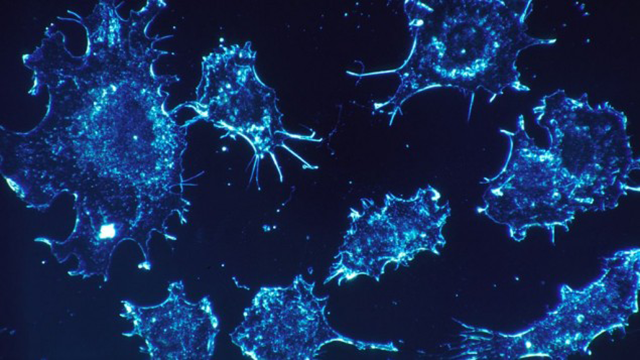In a trial, a photosynthesis-based therapy eliminates cancer in over 80% of patients – and could be used to attack other cancers, too

Cancer cells (Pixabay)
Scientists at the Weizmann Institute may have found the cure for prostate cancer, at least if it is caught in its early stages – via a drug that doctors inject into cancerous cells and treat with infrared laser illumination.
Using a therapy lasting 90 minutes, the drug, called Tookad Soluble, targets and destroys cancerous prostate cells, studies show, allowing patients to check out of the hospital the same day without the debilitating effects of chemical or radiation therapy or the invasive surgery that is usually used to treat this disease.
The drug has been tested in Europe and in several Latin American countries, and is being marketed by Steba Biotech, an Israeli biotech start-up with R&D facilities in Ness Ziona. The drug and its accompanying therapy were developed in the lab of Weizmann Institute professors Yoram Salomon of the Biological Regulation Department and Avigdor Scherz of the Plant and Environmental Sciences Department.
Based on principles of photosynthesis, the drug uses infrared illumination to activate elements that choke off cancer cells, but spares the healthy ones.
The therapy was recently approved for marketing in Mexico, after a two-year Phase III clinical trial in which 80 patients from Mexico, Peru and Panama who suffered from early-stage prostate cancer were treated with the Tookad system. Two years after treatment, over 80% of the study’s subjects remained cancer-free.
A similar study being undertaken in Europe showed similar results, Steba Biotech said, and the company had submitted a marketing authorization application to the European Medicine Agency for authorization of Tookad as a treatment of localized prostate cancer.
The approved therapy was developed by Salomon and Scherz using a clever twist on photosynthesis called photodynamic therapy, in which elements are activated when they are exposed to a specific wavelength of light.
Tookad was first synthesized in Scherz’s lab from bacteriochlorophyll, the photosynthetic pigment of a type of aquatic bacteria that draw their energy supply from sunlight. Photosynthesis style, the infrared light activates Tookad (via thin optic fibers that are inserted into the cancerous prostatic tissue) which consists of oxygen and nitric oxide radicals that initiate occlusion and destruction of the tumor blood vessels.
These elements are toxic to the cancer cells, and once the Tookad formula is activated, they invade the cancer cells, preventing them from absorbing oxygen and choking them until they are dead. The Tookad solution, having done its job, is supposed to then be ejected from the body, with no lingering consequences – and no more cancer.
With the drug approved for prostate cancer – and able to reach cancerous cells that are deep within the body via a minimally invasive procedure – Steba believes it may be able to treat other forms of cancer. In fact, the company said, it is also pursuing early stage studies of Tookad in esophageal cancer, urothelial carcinoma, advanced prostate cancer, renal carcinoma, and triple negative breast cancer in collaboration with Memorial Sloan Kettering Cancer Center, the Weizmann Institute, and Oxford University.
“The use of near-infrared illumination, together with the rapid clearance of the drug from the body and the unique non-thermal mechanism of action, makes it possible to safely treat large, deeply embedded cancerous tissue using a minimally invasive procedure,” according to Steba.
The Weizmann Institute has been working with Steba researchers for some 20 years to develop Tookad, said Amir Naiberg, CEO of the Yeda Research and Development Company, the Weizmann Institute’s technology transfer arm and the licensor of the therapy. “The commitment made by the shareholders of Steba and their personal relationship and effective collaboration with Weizmann Institute scientists and Yeda have enabled this tremendous accomplishment.”
“We are excited to bring a unique and innovative solution to physicians and patients for the management of low-risk prostate cancer in Mexico and subsequently to other Latin American countries,” said Raphael Harari, chief executive officer of Steba Biotech. “This approval is recognition of the tremendous effort deployed over the years by the scientists of Steba Biotech and the Weizmann Institute to develop a therapy that can control effectively low-risk prostate cancer while preserving patients’ quality of life.”
